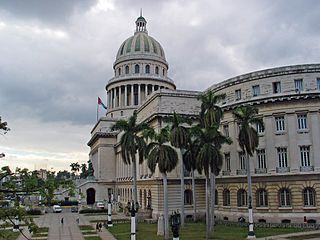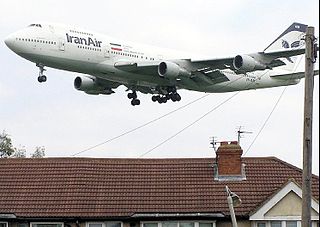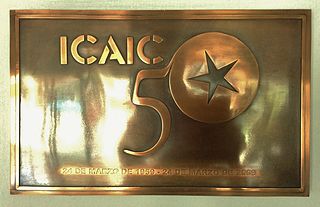| Jurisdiction/Region | Summary of certain restrictions |
|---|
 Belarus Belarus | Persons the US government believes to be undermining Belarus' democratic processes or institutions, committing political repression activities, and/or misusing public assets and public authority [32] |
 Central African Republic Central African Republic | Persons the US government believes is responsible, complicit, or have engaged in actions that threaten peace, security, or stability of the Central African Republic, including actions that undermine democratic processes or institutions, threaten the political transition process, target civilians, or UN and other peacekeeping operations through the commission of acts of violence, use of children in armed groups, or obstruct the delivery of humanitarian assistance [33] |
 Democratic Republic of the Congo Democratic Republic of the Congo | Persons the US government believes is a political or military leader of an armed group operating in the DRC that impedes the peace, security, or stability of the DRC, including actions that undermine democratic processes or institutions, threaten the political transition process, target civilians, or UN and other peacekeeping operations through the commission of acts of violence, use of children in armed groups, or obstruct the delivery of humanitarian assistance [34] |
 Ethiopia Ethiopia | Persons the US government believes is responsible for or complicit in actions that threaten the peace, security, or stability of Ethiopia, including expanding the crisis in northern Ethiopia or obstructing the peace process, or engaging in actions that undermine democratic processes or institutions, including corruption or serious human rights abuses, to obstruct the delivery of humanitarian assistance, target civilians through violence, or committing attacks against UN or African Union personnel.
Entities the US government believes is a military or security force operating in northern Ethiopia after November 1, 2020, or has engaged in activities that have contributed to the crisis in northern Ethiopia [35] |
 Hong Kong Hong Kong | Persons the US government believes is responsible for developing, adopting, or implementing the Hong Kong national security law, or be responsible or complicit in actions or policies that undermine democratic processes or institutions in Hong Kong, or threaten the peace, security, stability, or autonomy of Hong Kong, including censorship, extrajudicial rendition, arbitrary detention, or torture of any person in Hong Kong [36] |
 Iraq Iraq | Persons the US government believes has committed acts of violence that threaten the peace or stability of Iraq or the government of Iraq, undermine efforts to promote economic reconstruction and political reform in Iraq, or obstruct the provision of humanitarian assistance [37] |
 Lebanon Lebanon | Persons the US government believes has taken action to undermine Lebanon's democratic processes or institutions, contributed to the breakdown of the rule of law in Lebanon, support the assertion of Syrian control or influence in Lebanon, or infringing or undermining Lebanese sovereignty [38] |
 Libya Libya | Persons the US government believes is responsible for actions that threaten the peace, security, or stability of Libya, obstruct, undermine, delay, or impede the political transition process, misappropriate state assets, or threaten state financial institutions, or planning, directing, or committing attacks on Libyan state facilities or civilian facilities, or illegally exploit and export Libyan natural resources [39] |
 Mali Mali | Persons contributing to the Conflict in Mali including Government officials tied to Wagner Group such as Malian Defense Minister Colonel Sadio Camara, Air Force Chief of Staff Colonel Alou Boi Diarra, and Deputy Chief of Staff Lieutenant Colonel Adama Bagayoko [40] [41] |
 Myanmar Myanmar | Persons the US government believes operates in the defense or other critical sectors of the Burmese economy, or are responsible for actions or policies that undermine democratic processes or institutions or threaten the peace, security, or stability of Myanmar, or limit the exercise of freedom of expression or assembly, or arbitrary detention or torture, or is a leader of the military or security forces of Myanmar, or the government of Myanmar after February 2, 2021 [42] |
 Nicaragua Nicaragua | Persons the US government believes is responsible for serious human rights abuses, actions that undermine democratic processes or institutions or threaten the peace, security, or stability of Nicaragua, or engaged in corrupt transactions related to the misappropriation of public assets [43] |
 Somalia Somalia | Persons the US government believes has engaged in acts that threaten the peace, security, or stability of Somalia including threatening the peace process, misappropriating public assets, or engaging in acts of piracy, or obstructed the delivery of humanitarian assistance, engaged in acts of violence targeting civilians, recruited children in armed conflict, or imported or exported charcoal from Somalia [44] |
 South Sudan South Sudan | Persons the US government believes has engaged in acts that threaten the peace, security, or stability of South Sudan, including actions that threaten the peace process, expanding the conflict in South Sudan, committing human rights abuses and violence against civilians, or attacks against UN or other international peacekeeping operations [45] |
 Sudan Sudan | Persons the US government believes has engaged in acts that threaten the peace, security, or stability of Sudan, including undermining the peace process and the democratic process or institutions of Sudan, or engage in censorship, corruption, misappropriation of state assets, serious human rights abuses, acts of violence against civilians, or obstruction of or attacks against UN peacekeeping missions [46] |
 Venezuela Venezuela | The Government of Venezuela, [47] those operating in the Venezuelan gold sector, or persons the US government believes is engaging in corrupt government programs, [48] engaged in actions that undermine democratic processes or institutions, commit significant acts of violence, or restrict the freedom of expression or peaceful assembly [49] |
| Western Balkans | Persons under open indictment by the International Criminal Tribunal for the former Yugoslavia, or has committed actions that threaten the peace, security, stability, or territorial integrity of any area in the Western Balkans, including actions that undermine the democratic processes or institutions in the Western Balkans, obstructed the peace process, engaged in serious human rights abuses, or are responsible for the misappropriation of public assets for personal gain [50] |
 West Bank West Bank
 Israel Israel | Persons or entities the US government believes has enacted, implemented, or enforced policies that threaten the peace, security, or stability of the West Bank, including violence targeting civilians, property destruction, seizure or dispossession of property, or has or is planning to commit terrorist attacks in the region [51] |
 Yemen Yemen | Persons the US government believes has engaged in acts that threaten the peace, security, or stability of Yemen, including obstructing the peaceful transition of power or the political process [52] |
 Zimbabwe Zimbabwe | Persons the US government believes has engaged in actions to undermine Zimbabwe's democratic processes or institutions, engaged in human rights abuses or public corruption, as well as senior officials of the Government of Zimbabwe, or is a state-owned institution [53] |












